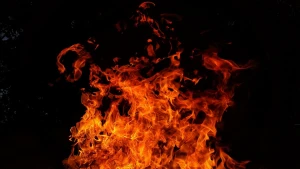
"The toughest day in Mariupol" — Azov fighter Bohdan Ravlikovskyi about crossing from port to Azovstal
From the beginning of the Russian invasion until the last moment, Bohdan Ravlikovskyi was among those who defended the port of Mariupol and Azovstal. Following the defense, he endured nearly a year of captivity in Russia
Azov soldier with a call name “Ravlyk” was born in Lviv in 1992. He graduated from the Lviv State University of Internal Affairs, first served in the National Guard, and in 2015 joined Azov. Since 2014, the soldier has participated in combat operations in eastern Ukraine, including the battles for the Svitlodarsk bulge (the fighting for control of the Svitlodarsk district, Donetsk region, during the war in eastern Ukraine) with Azov. He faced the full-scale Russian invasion on February 24, 2022, in Mariupol. He defended the city, was the commander of a position in the port of Mariupol and a battalion commander at Azovstal.
Read about the defense of the port of Mariupol and the battle for Azovstal in the first part of the interview with Bohdan Ravlikovskyo for Espreso.
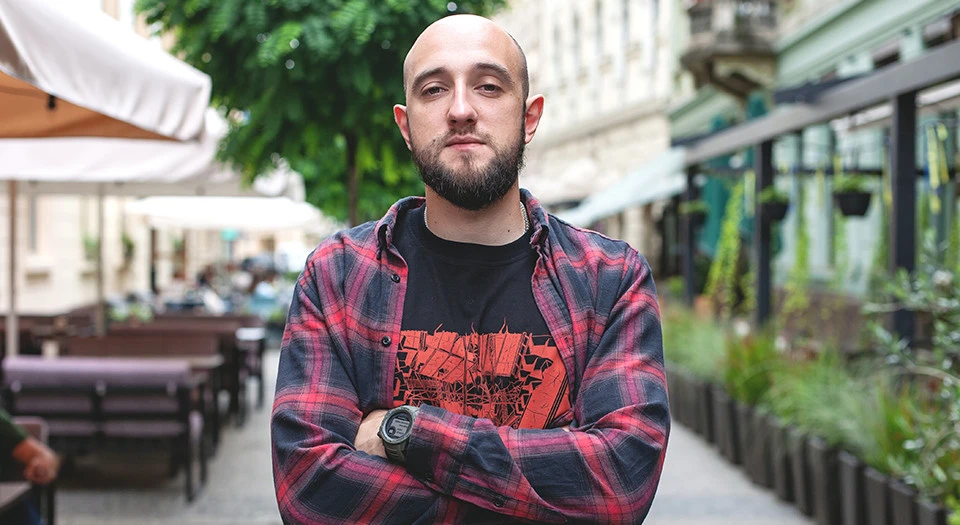
Photo: Andriana Stakhiv
The beginning of the invasion
Were you on the frontline when the invasion started?
For me the invasion started a little earlier, not on February 24, but February 22. There was an officer training course going on, but we cut it short. Redis, the squad leader, said that he did not like the situation in Ukraine. He said, "Let's get ready for war". And on February 24, I was already performing a combat mission on the anti-sabotage defense of Mariupol and the entire coast. I was a senior member of the rapid response team in the port of Mariupol.
So, in fact, by February 24, you already knew that it was going to start?
We did not know, but we expected it. The accumulation of enemy forces and means was very large.
Did you have a sense of what this could turn into before the data on the accumulation? During the ATO?
It was all based on intuition, on experience. We had never seen such an accumulation of enemy forces before. It was the first time, and we were ready for it. Back in the summer, as soon as the enemy began to amass troops, we went on various missions, were on the border with Russia, in Stanytsia Luhanska (settlement on the banks of the Siverskyi Donets River in eastern Ukraine), where we conducted counter-sabotage activities. By winter, the enemy's intentions became clearer.
Mariupol. Now it is one of the most destroyed cities in Ukraine. Were Russian troops destroying it deliberately, or were they just hitting everything they could get to?
It was done both consciously and unconsciously. It is clear that all the artillery that was targeting the city hit the infrastructure. Plus, it was deliberate because they could not break through our line of defense, so they were destroying houses and the entire infrastructure. We are often asked the question: why didn't you go to the field to fight? But we have a clause in the Army's charter called "urban combat," which clearly states that urban battles take place for large streets, parks, and large capital buildings. We could not do otherwise. The ratio of forces was mostly on the side of the enemy, but we equalized it by having buildings, houses, and places to hide. That's why it worked out that way. But such attacks as the air strikes on the maternity hospital and the drama theater at that time were probably deliberate on the part of the enemy. They wanted to create panic among the townspeople. The strike on the power plants resulted in a blackout, loss of communication, no water, no heating, and then the strikes on the city. They were meant to incite the people, to make them angry with us.
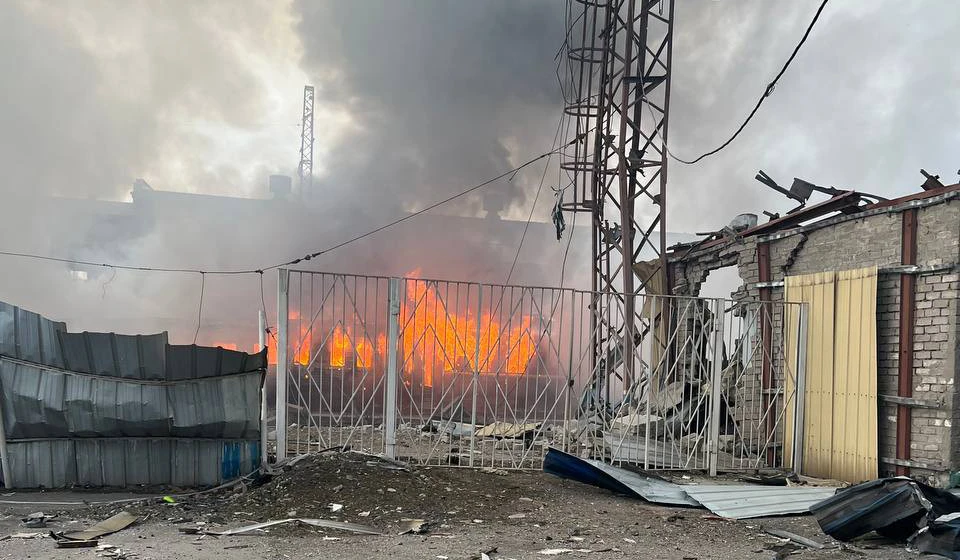
Photo: Bohdan Ravlikovsky at the port.
You talked about "going out into the field," but this means being completely open.
Yes! They were counting on that. And, to be honest, I didn't believe that we would be stormed in the city. But after the fighting started, I realized that it would be intense and probably long-term. There were not enough of us then. At that time, it was very difficult to hold Mariupol. Of all the structures that were in the city at the time, Azov was the most organized. We had communication and a clearly structured chain of command. Other units were not so well organized. It was difficult in the Territorial Defense Forces, and in the National Guard it was also difficult, because there were conscripts and contract soldiers. There were also warrant officers and officers who had a slightly different specificity of work. There were police officers, which is even more difficult because they work in the legal sector, and that's not what was needed there. There were sailors who also had to be instructed during the battles and had to be trained, so to speak, in practical exercises. I argued for a long time with some Navy soldiers, forced them to wear first aid kits, because they wore them like a keychain, and could easily leave them behind. I made them put the first aid kits on their armor.
Port defense
I know that you have been defending the port of Mariupol for a long time. How did it happen? How did you build this defense? How did you manage to hold it for so long under such pressure?
By February 24, I already had certain tasks. In case of sabotage or attack, I had an order in place. My first task was to cover the engineering group that was engaged in mining the coast. Not the beach itself. They were mining the waters with the anti-ship mines. They do not work on people, only on ships. The second is to build a minimum defense in the port. This was the task until February 24. After the invasion, I realized that the commander who was in the port and responsible for me, for my command, was, let's say, incompetent.
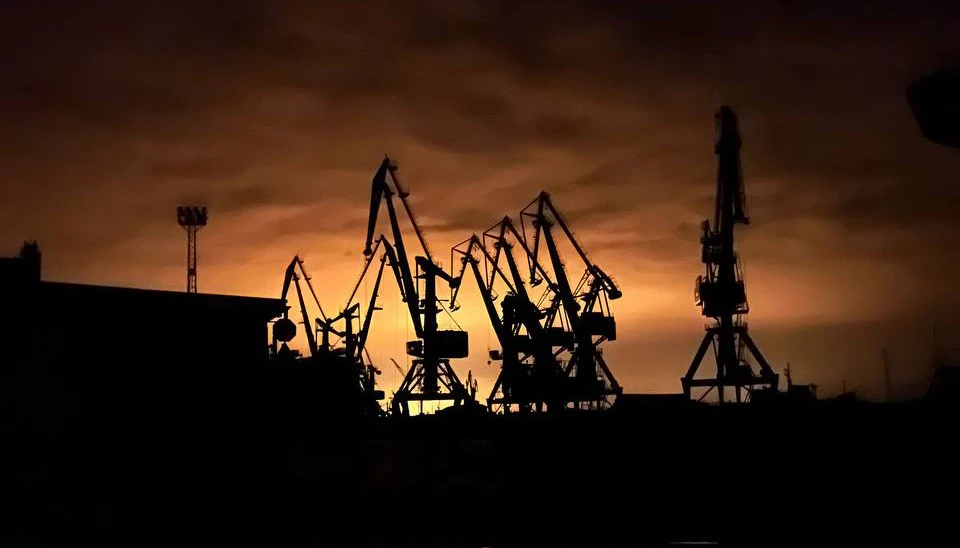
Photo: Bohdan Ravlikovsky at the port.
So it wasn't an Azov soldier?
No, it was the captain, the commander of the Sahaidachny ship. The ship itself was undergoing repairs, and the captain was seconded to the port of Mariupol, where he was in charge of organizational matters. At that time, he was my commander, the commander of the engineers, the two Hyurza boats that remained there, and the commander of the Donbas ship. That is, he commanded the entire group in the port. On February 24, he was very scared and did not know what to do. He dismissed people, they were going in different directions, getting into civilian cars, going somewhere. I asked him to control the people. I arrived in an APC to his ship, everything was fine, I had 6 Azov soldiers and the National Guard, they were also performing tasks in the port.
But 6 people is not enough.
It was enough for me at first. Later, as things got more complicated, I made requests to the battalion commander, and he allocated more people and resources. And this commander was in a panic. I told him, "Command the people, stop them, because they are getting in and going somewhere." When two boats were leaving Berdyansk in our direction, people started to run away because they did not know whether they were on Ukraine’s or Russia’s side. In the end, it turned out that they were Ukraine’s border guard boats. Those people ran away and then came back. I contacted my superiors and explained the situation. I said: there's some inadequate person here, he's going somewhere, coming somewhere. And then at three in the morning on February 25, I found out that they were already near Zaporizhzhia.
Did they leave the port?
Yes, and Mariupol. They left, as I understand it, with their command, left their soldiers without commanders and those two boats. He said to sink them. I approached the boat captains, and they said, "We will sink them and leave". I said, "Leave where? Here you have two undamaged, working boats. They have two modules each that can fire, they can be useful. They have locators, ammunition. We took a lot of ammunition from there and then gave it to the guys who came to us, loaded it and took it to Mariupol. We also drained fuel for tanks from warships.
How long did you hold the port?
We held the port until the crossing. Somewhere in mid-March, the hostilities started in the port itself. Before that, it was mostly artillery attacks and enemy attempts to de-mine the port. Two passages were mined, and boats were flooded in them: two repair cranes and an old ship. The Ruscists came in two boats and tried to clear the mines. They defused one mine and fled. We were watching when they came back and destroyed the boat. After that, they did not try to enter the port from the sea. Later, the enemy tried to enter the port with infantry. There was a mountain they came down from, but we prevented this attempt. They retreated and hid in civilian houses, with an old man who lived there. They forced him to collect weapons: the man would go out and collect assault rifles and ammunition from those Russian soldiers who had died.
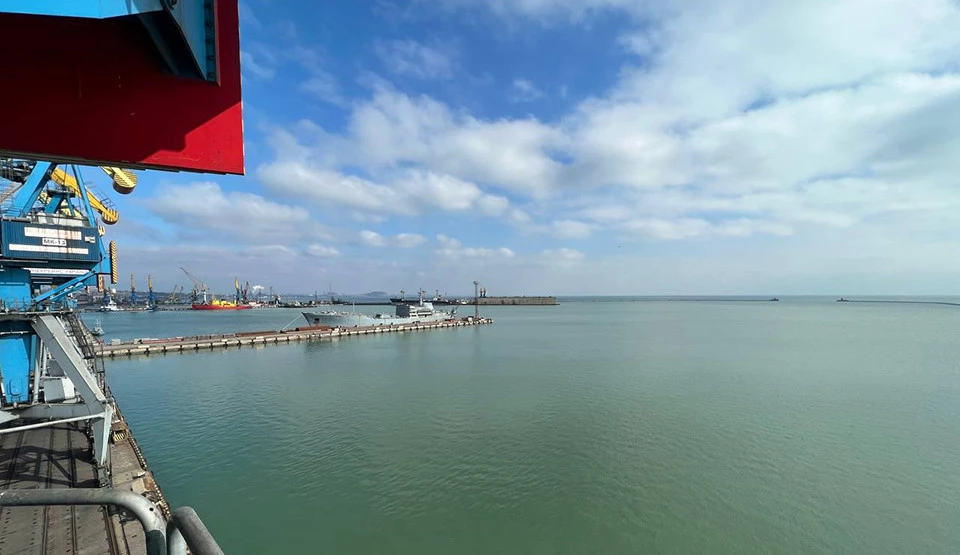
Photo: Bohdan Ravlikovsky at the port.
Because they realized that you would not attack him?
Yes. The invaders were sitting in that house, and at night they tried to leave it. But by that time our guys had already arrived with thermal sights and did not allow them to leave. Their losses were 10-12 people during that day and night. After that, they tried to leave once more, but also without success. They brought tanks, and I expected them to come from above, so I built a defense on the hill. But they came along the beach. We quickly rebuilt the defense.
The checkpoints had been sealed off with concrete blocks to prevent tanks from entering, but they managed to breach the wall and gain access to the port. We were in a very unfavorable position, so we had to retreat a bit. Then we destroyed one enemy tank. The other one was just shooting randomly at the houses. We picked up a position, hit the tank, the crew ran out of it and fled with the infantry and the whole tank. The next morning they tried to take the tank back, but we destroyed it. The occupiers didn't like it, they started shelling us massively with artillery, and later tried to enter with the tank again. But the only trace left of it was a black spot - we destroyed it together with the crew. Then they stopped and realized that they could not get to the port. They started to work from the mountain, entering our rear and flanks. I had to gradually shift my positions. By the way, I recently talked to the guys from the ship, who thanked us for saving them. It was a Ukrainian crew, they were on the ship when a Russian missile hit it. The ship caught fire, and we evacuated them at night.
Was it a military ship or a civilian ship?
Civilian, they were all civilians. All the crews were on the ships. We built our defense so as not to hit them.
In fact, you had to build the defense in such a way as to protect your civilians as well?
Yes, we did. There was even one Russian crew. I found out about it when the battalion commander said that there had been an interception and they discovered that we had a ship with a Russian crew in the port, "Find it, because they are adjusting fire.” They went out on the bridge and watched through optical means what was happening. I took all their electronic devices: phones, laptops and optical devices. I was told to take the Russians out and lock them up somewhere, isolate them. But I decided that I didn't have the extra strength to guard them and feed them, so I left them on the ship. I took the Ukrainian flag with me. It was clean, by the way, and their Russian flag was very dirty.
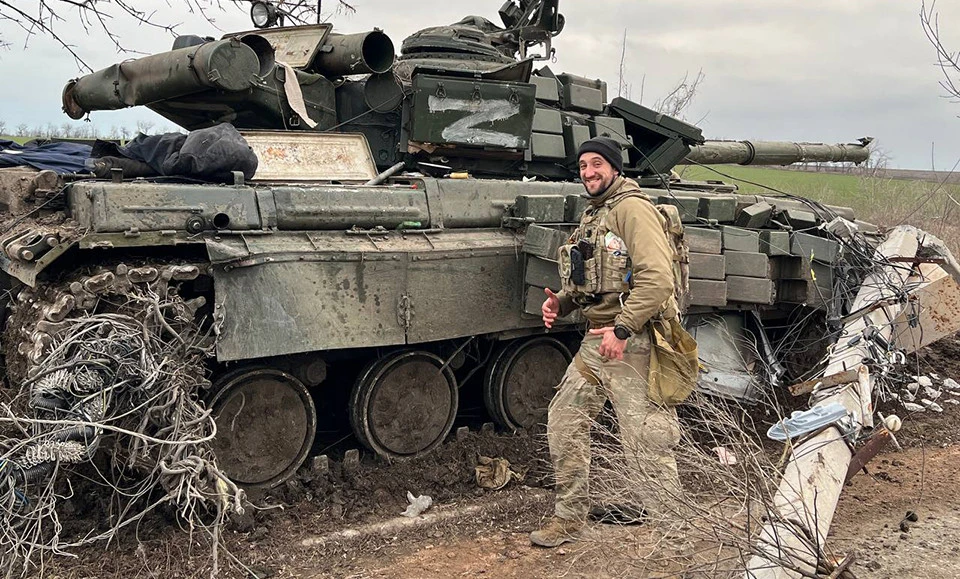
Photo: from Bohdan Ravlikovskyi's personal archive
Crossing to Azovstal
At what point did you have to leave and how did it happen?
It was April 14, in the evening. We didn't have enough strength, we were already surrounded. We were isolated from Azovstal. The battalion commander said that we would make a crossing. It was impossible for us to hold on, we were pushed to the sea. That is, in a day or two, we could have been defeated. I got a call and was told to prepare the column. At three o'clock the column had to be in a certain place. It was a street near the sea.
Was it still possible to get out there?
Yes, it was still relatively safe at that moment. We had to fight our way to Azovstal. At night, I took the guys off the position and announced the order of actions. What we could not take with us was destroyed. They burned a truck with ammunition and assault rifles because there were simply not that many people. I was the first to drive the APC, followed by an Ural, the 23rd Marine Security Detachment and the police. We departed, stopped, the shelling started, we had to get out, then got back in and started moving again. This was probably the toughest day I had in Mariupol. The time we had to organize this crossing was extremely short. Three hours is not enough to organize such an operation. But we had to do it. I think it was the right thing to do. Because at least we pooled our forces and resources at Azovstal.
By the way, at the beginning, while the port was still standing, we were greatly helped by helicopters that flew in. But the crossing was difficult. We got to the first bridge, there was a blockage, I got out of the APC and started to "clear" it - all under fire, the artillery fire did not stop for a second. Eventually, everyone left and my APC and the Ural left without me. Then I ran another kilometer and a half on foot to Azovstal. I crossed this bridge from bank to bank, tired. I thought, 'If I die, so be it, I can barely walk. But I got there and entered the first bunker. There were a lot of wounded during the crossing, and they were being helped. I gave away one of my tourniquets (I had about 3 or 4 of them), I had scissors with me, so I cut clothes while the medics provided first aid to the guys. There were some who lost a leg during the crossing, and others had their limbs cut off right there. Many of my friends died during the crossing. Including my best friend.
What happened to those civilian crews who stayed in the port?
We had no place to take them. The civilians remained on the ships. As far as I know, they were already evacuated by the so-called “DPR” fighters. At the same time, they were not released as civilians, they were captured, filtered, and then held in Donetsk. And only then were they exchanged through Crimea.
Azovstal's defense
After the crossing, did you stay at Azovstal?
Yes, I was appointed battalion commander at Azovstal after the previous commander, my friend, was wounded. I came to Redis, and he assigned me a section of the frontline, which was the slag mountain and the second checkpoint. I was mostly engaged in organization. At first, everything was going well, the guys still had some motivation. We were given a few days to rest after the crossing, to sleep. Then I organized the battalion headquarters, distributed responsibilities, and we began to take up the defense. But in May, morale began to drop. We had losses, we were isolated, had little room for maneuvers, and no large-caliber ammunition. To top it all off, we were constantly being hit by enemy aircraft and artillery - it just wouldn't stop. We always had information about when the planes were taking off, so we were ready. They made 3-4 raids a night. It was difficult, there were moments when their SOBR (Russia’s Specialized Rapid Response Unit) came in. These are the well-trained ones. These are no "DPR amateurs" who stormed us earlier in Mariupol, but professional troops. Then they took the slag mountain from us. The guys were very tired and could not defend it. I had to personally come and motivate them. We were able to climb the mountain, neutralized several enemies, but could not hold it anymore. So we rebuilt the defense further away.
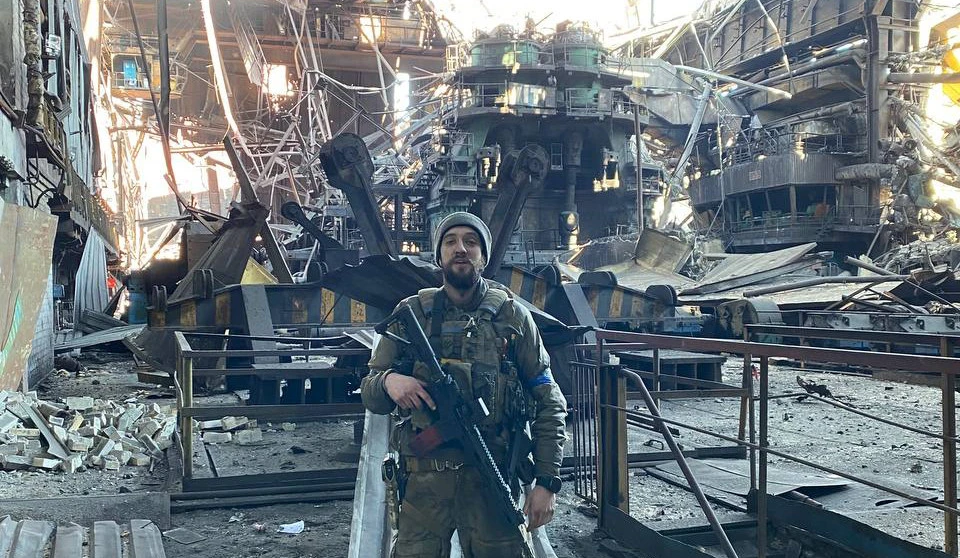
Photo: from Bohdan Ravlikovskyi's personal archive
In fact, you were constantly on the edge.
Always. I injured my leg on the mountain when I was going down. I thought it was broken because I heard a crunch. On the next mission, we were stormed by the SOBR. We had very poor communication, the enemy's electronic warfare equipment jammed it, and I had to be closer to the fighting. Then I got injured in my left eye. But now everything is fine.
How was the assistance to the wounded organized?
A hospital was set up in one of the Azovstal bunkers. All the wounded were taken there, but it was not easy to do because everything had to be done very quickly. At first, we provided first aid on the ground and tried to stabilize the person. If the fighter was stable, he could still wait a few days. We chose the moments when we could arrive by car, quickly load the wounded, drive them away and hide the car again. We had less and less equipment because of the constant shelling. I had an MT-LB with which I tried to evacuate people. It just drove at full speed, picked up the wounded and returned, unloaded the wounded, and the evacuation team picked them up and brought them to the hospital. And the vehicle would go back.
Everything had to be planned out by the second, I suppose.
Exactly, everything was done very precisely. A quadcopter would take off, and a team would be organized to go. The quadcopter would assess the situation around us, and only then could we work. We installed special equipment so that in case of an attack on the vehicle, we could repel it. I was in the hospital, perhaps, twice. I came to visit my brother-in-arms, the previous battalion commander. And once again with a wounded eye. It was not a particularly pleasant place. There were dead soldiers in bags, wounded soldiers walking and lying there, and operations were performed right there on the table, on a stretcher. There was no separate operating room, because the enemy was attacking the hospital, and there was a collapsed wall. At the end, there were not enough medicines. Then Redis and his team had to make a decision to stop the defense of Mariupol at the command of Commander-in-Chief Zelenskyy.
In the second part of the conversation with Bohdan Ravlikovskyi, read about leaving Azovstal, almost a year of Russian captivity, and returning to Ukraine.
- News









